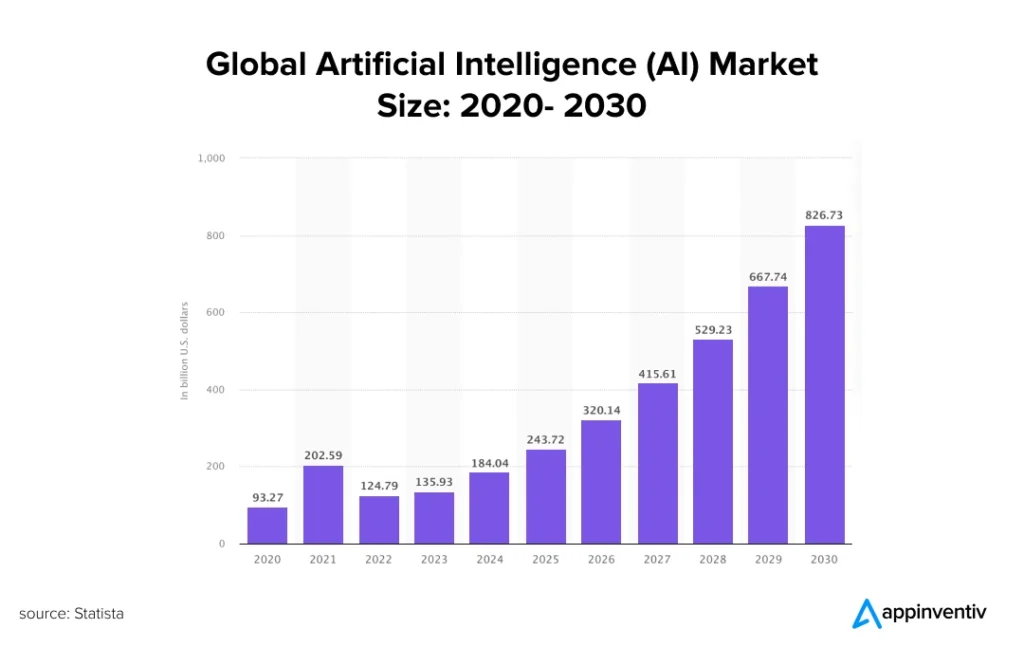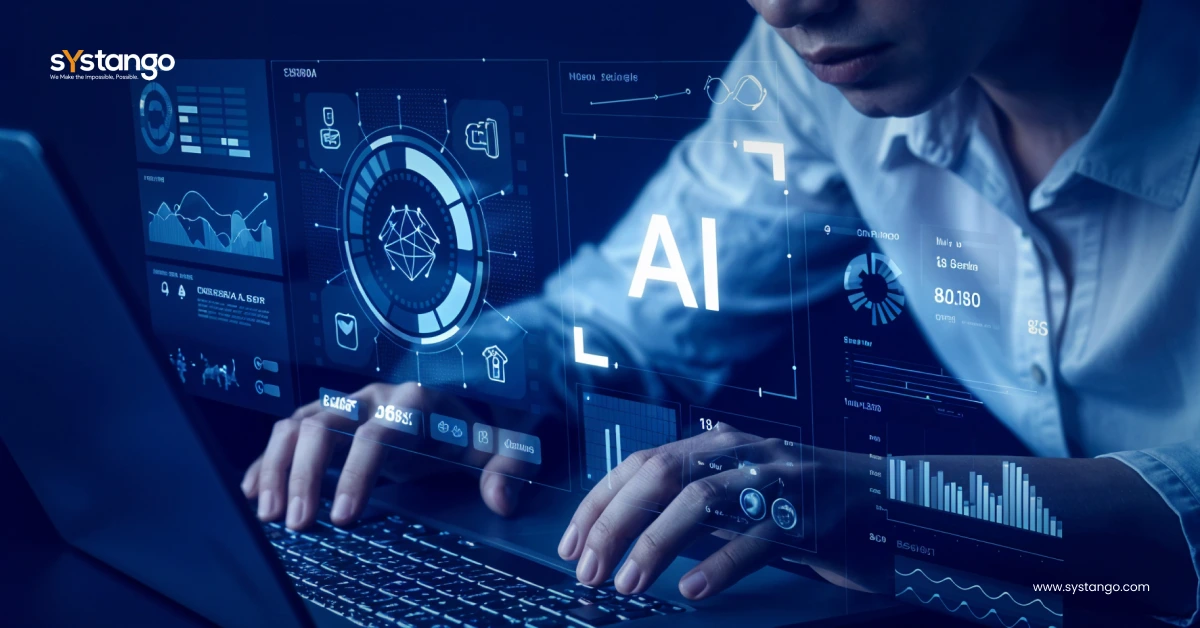The rapid advancements in artificial intelligence (AI) are set to reshape how industries operate and how we interact with technology in everyday life. As we look toward 2025, AI is no longer just a futuristic concept; it is becoming deeply integrated into nearly every aspect of society. From healthcare to finance, AI is transforming the landscape of business, creating new opportunities, and revolutionizing everyday activities. In the USA, businesses are keen to adopt AI technologies to stay competitive in an increasingly digital world.
In this article, we will explore the top AI software trends in the USA for 2025 and how they are poised to transform various industries and improve daily life for individuals and organizations alike.
The Rise of Generative AI: Changing Content Creation and Communication
Generative AI has made significant strides in recent years and will continue to dominate AI software trends in 2025. This category of AI involves using algorithms to generate new content, such as text, images, audio, and even video, that closely mimics human creativity.
How Generative AI is Impacting Content Creation
- Content Generation Tools: Platforms like GPT (Generative Pre-trained Transformer) models, including the latest iterations of OpenAI’s GPT-4, are enabling businesses to automate the generation of high-quality content. From blog posts and marketing copy to reports and creative writing, generative AI is streamlining content production.
- Marketing Automation: AI-powered platforms can create personalized ad campaigns, design graphics, and even optimize social media posts, drastically improving marketing efficiency and engagement.
- Customer Support Chatbots: Generative AI is also enhancing the capabilities of chatbots, providing businesses with intelligent, conversational agents capable of resolving customer queries with human-like responses.
Key Industries Benefiting from Generative AI
- E-commerce: Personalized product descriptions and AI-generated recommendations are transforming online shopping experiences.
- Entertainment: Filmmakers, game designers, and music producers are using generative AI to create more immersive and interactive experiences.
- Healthcare: AI algorithms assist in developing personalized treatment plans and generating insights from medical records and research data.
AI in Healthcare: Revolutionizing Diagnostics and Treatment
AI has the potential to revolutionize the healthcare industry by improving diagnostic accuracy, personalizing treatment plans, and streamlining administrative tasks. By 2025, AI will be more widely adopted in hospitals, clinics, and research labs.
Key AI Applications in Healthcare
- AI-Powered Diagnostics: Machine learning algorithms are capable of analyzing medical images (e.g., X-rays, MRIs) with high precision, helping doctors detect conditions like cancer and heart disease early.
- Personalized Medicine: AI can analyze patient data, including genetic information, to create tailored treatment plans that are more effective and have fewer side effects.
- Drug Discovery: AI is being used to accelerate the drug discovery process, helping pharmaceutical companies develop new medications more efficiently and cost-effectively.
The Impact on Patient Care
- Enhanced Efficiency: AI can automate routine tasks, allowing healthcare professionals to focus more on patient care.
- Improved Accuracy: AI algorithms reduce human error in diagnostics, ensuring patients receive the right treatments promptly.
- Remote Monitoring: With wearable devices and AI software, healthcare providers can continuously monitor patients’ vital signs, even from a distance, providing better care and early intervention.

AI in Finance: Transforming the Financial Landscape
The financial sector has been one of the earliest adopters of AI technology, and by 2025, AI will have a more profound impact on banking, investments, and financial services.
Key AI Applications in Finance
- Fraud Detection and Prevention: AI algorithms can analyze transaction patterns to identify fraudulent activities in real-time, reducing the risk of financial crimes.
- Algorithmic Trading: Machine learning models are increasingly being used for high-frequency trading and investment strategies, helping firms make better predictions and capitalize on market movements.
- Customer Service: AI-powered chatbots and virtual assistants are revolutionizing customer service in banks and financial institutions, providing quick and personalized responses to inquiries.
AI’s Role in Financial Inclusion
- Credit Scoring: AI is enabling the creation of alternative credit scoring models, helping individuals with limited credit history access loans and financial services.
- Personalized Financial Advice: Robo-advisors powered by AI offer tailored financial advice and portfolio management services, making investment opportunities accessible to a broader range of people.
AI-Powered Automation: Streamlining Workflows Across Industries
Automation has been one of the most significant trends in business for the past decade, and AI is now taking it to the next level. By 2025, AI-powered automation will be widespread across multiple industries, making businesses more efficient and productive.
Key AI Automation Technologies
- Robotic Process Automation (RPA): AI-enhanced RPA is automating repetitive, time-consuming tasks across industries like finance, human resources, and supply chain management. This includes data entry, invoice processing, and customer onboarding.
- AI-Driven Predictive Analytics: Businesses are leveraging AI-powered predictive analytics to forecast trends, demand, and risks, enabling better decision-making and resource allocation.
- Smart Manufacturing: AI-driven robots are being deployed in manufacturing plants to handle complex tasks, from assembly to quality control, improving production efficiency and product quality.
Benefits of AI-Powered Automation
- Cost Reduction: Automating manual tasks reduces operational costs and allows businesses to allocate resources to more strategic activities.
- Faster Decision-Making: AI algorithms can process vast amounts of data quickly, providing businesses with real-time insights that inform decision-making.
- Enhanced Employee Productivity: By automating routine tasks, employees can focus on higher-value work that requires creativity and critical thinking.
AI for Everyday Life: Personal Assistants and Smart Homes
As AI becomes more integrated into consumer devices and applications, it is transforming how people interact with technology in their daily lives. Smart home devices, personal assistants, and AI-driven apps are making everyday tasks more convenient and efficient.
Key AI Technologies in Daily Life
- Virtual Assistants: AI-powered assistants like Amazon’s Alexa, Google Assistant, and Apple’s Siri are becoming more intelligent, enabling users to control smart devices, set reminders, and even complete tasks with voice commands.
- Smart Homes: AI-driven smart home systems are learning from user behavior to automate heating, lighting, and security settings, making homes more energy-efficient and secure.
- Personalized Recommendations: AI algorithms are powering recommendation engines on platforms like Netflix, Spotify, and Amazon, offering personalized suggestions based on user preferences.
The Impact on Daily Life
- Increased Convenience: AI is helping individuals save time and effort by automating routine tasks and providing personalized services.
- Improved Safety: AI-powered security systems can detect unusual activity and alert homeowners, providing an extra layer of protection.
- Better Decision-Making: With personalized recommendations, AI assists users in making informed choices about entertainment, shopping, and even health-related decisions.
Conclusion
AI is poised to transform industries and everyday life in the USA by 2025, with breakthroughs in generative AI, healthcare, finance, automation, and consumer technology. These innovations are not only enhancing business operations but also improving the way individuals live, work, and interact with technology. As AI continues to evolve, its influence will only grow, bringing new opportunities, challenges, and experiences.
